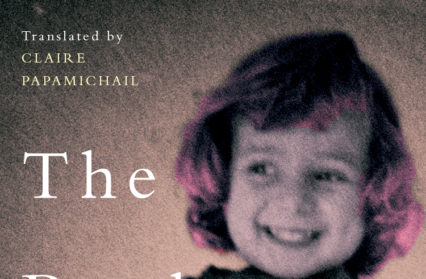Glen James Brown reviews The Book of Katerina, the acclaimed Greek novel from Auguste Corteau – translated by Claire Papamichail – in which the author envisions his mother’s own complex inner life following generations of illness and misfortune.
Auguste Corteau’s 2013 novel The Book of Katerina, translated here for the first time in English by Parthian Books, is a gleefully sardonic novel about illness and family, and how we can never quite cure ourselves of either.
The eponymous Katerina Horianos has committed suicide after succumbing to a lifelong battle with bipolar disorder, alcoholism and clinical depression. Watching from the corner of the room as her naked body is found by Petros, her only son, Katerina embarks on the story of her life leading up to this point. Only her story, like all of our stories, is not hers alone—it’s also her family’s.
The Book of Katerina is no grand family saga in the vein of, say, Isabelle Allende’s House of the Spirits, or more recently, Pachinko by Min Jin Lee. There is no elegant and vaulting architecture—nor any of the bloat—to the generations of the Horianos family. Instead, Katerina narrates the spill of their lives like a black sheep holed up in the corner of a family reunion, pouring grievance after hot grievance directly into our ear. There is a thrilling intimacy to this; Katerina’s posthumous urgency draws us in and keeps us orientated as she leaps about chronologically, wedging in just-remembered details—“Oh, yes, because I forgot to tell you…”—and leading us deeper into the tangle of people who made her, and those again who made them.
If you’re worried that this all sounds heavy, don’t be. Katerina’s got too much to get off her chest for outright solemnity, and death seems to have liberated her from any vestige of familial decorum—“His name is Takis, he is thirty-two, coming from some godforsaken village (how nasty I can get at times, for someone who doesn’t exist!)”. It’s with this incorporeal glee that she introduces us to her kin, which again, like every family, has its fair share of oddballs. After all, who isn’t related to a gummy aunt Fifi, tricked by the devious wife of a dentist into having every last tooth pulled? Or a godfather like Vangelis The Arse Snatcher, serial philanderer and wearer of ‘vomit-green and gingivitis-pink’ polyester suits?
The language of illness defines Corteau’s novel. Sickness and disease haunt the family like a curse. Sisters suffer schizophrenic breakdowns; sons are bundled off to hospitals for the mentally disabled. The maladies suffered by the Horianoses are endless—depression, strabismus, tuberculosis, consumption, missing lungs, lisps, limps, OCD, phobias, panic attacks, osteoporosis, bipolar disorder, strokes, pulmonary edemas, alcoholism and obesity. Nobody is safe, the maladies passed down with each new birth almost as if in judgment or spite, separating the afflicted into tribes pitted against each other. Katerina explains her family in terms of sickly battle-lines carved between parent and child, brother and sister, nephew and niece. In The Book of Katerina, illness functions as a literal but also figurative malaise bequeathed to the next generation.
Nowhere is this more prevalent than in the book’s central relationship between Katerina and her son Petros. Katerina’s love for her only child is searing, all-consuming, and rapidly becomes the only thing protecting her from her own worsening mental state. But as the boy becomes a man troubled by his own inherited illnesses, this knowledge—and Katerina’s overbearing love—becomes too great a burden to bear. Katerina and Petros’ relationship exists at the nexus of illness and love. Each feeds the other, and it’s in the tragedy of their symbiotic bond that we find a clue to the reoccurring phrase with which Corteau introduces many of the book’s chapters: ‘The Horrors of Others’. True horror, then, is not the cruelty of siblings, or even parental violence and neglect, but the love which shackles us to each other so that we can never truly escape our blood. It can be powerful enough to destroy us, as it eventually does Katerina.
Auguste Corteau is the penname of the writer Petros Hatzopoulos, and this is his mother’s story. Reading the book, I began to think how someone could ever claim authority over the thoughts and motives of the dead, however close in blood. Is it even possible? But The Book of Katerina knows what family really is—an undulating mass of secrets, half-truths and gaps that compels us to make sense of it while there’s still time, and to pass it on if we can.
The Book of Katerina is available in English via Parthian Books.
Glen James Brown is a regular contributor to Wales Arts Review. His latest novel, Ironopolis, was shortlisted for both The Orwell Prize 2019 and The Portico Prize, and is available now from Parthian.











